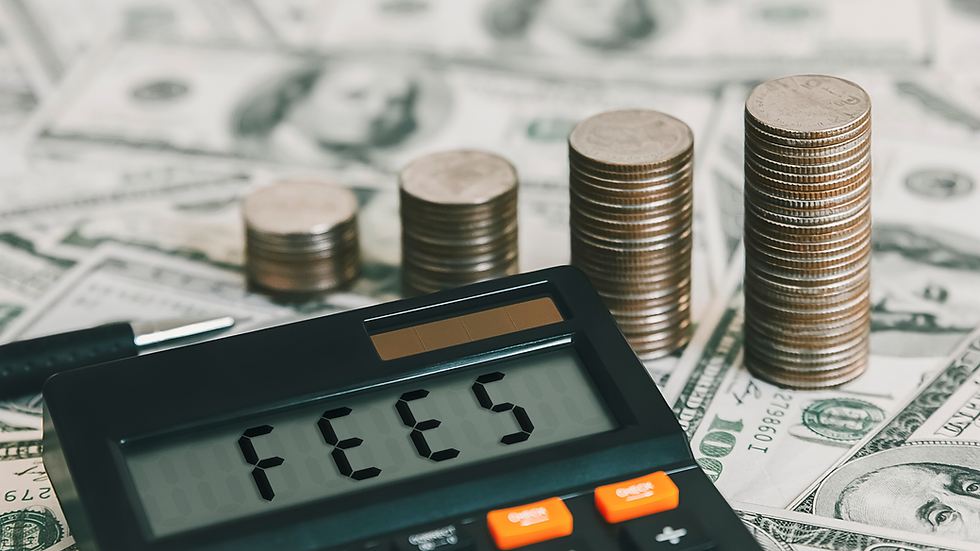The Silent Killers of Your Finances: Hidden Fees That Drain Your Wallet
- Jasmine Trespecio
- Sep 2, 2025
- 3 min read

When we think about financial trouble, we often imagine big, sudden expenses — medical bills, car repairs, or job loss. But sometimes, it’s not the obvious that does the most damage. It’s the quiet, sneaky charges that creep in over time. These are the silent killers of your finances — and they’re hiding in plain sight.
From digital transaction fees to account maintenance costs, these small but consistent expenses can chip away at your hard-earned money without you even noticing. Let’s shine a light on these invisible threats so you can protect your financial health.
1. Digital Payment & Transfer Fees
In today’s cashless world, we use payment apps and online transfers for just about everything — splitting bills, sending money to family, or even paying rent. But have you ever stopped to calculate the fees?
Apps like Venmo, Cash App, and PayPal charge fees for instant transfers or credit card payments.
Bank-to-bank transfers (especially international ones) can cost a few dollars each time — or more.
Even crypto transactions come with gas fees or network fees that vary wildly.
These fees may seem small — $1.75 here, 3% there — but if you’re making multiple transactions a month, they add up fast.
2. Monthly Maintenance & Account Fees
Some banks charge you just to hold your money. Yes, really.
Monthly maintenance fees can range from $5 to $25.
You might also be hit with inactivity fees, low balance fees, or paper statement fees.
Banks often waive these fees if you meet certain criteria — like maintaining a minimum balance or setting up direct deposit — but not everyone qualifies.
3. ATM & Out-of-Network Fees
Ever needed cash in a hurry and used the nearest ATM, only to be charged $3 by the ATM and another $2.50 by your own bank?
Out-of-network ATM fees are some of the most unnecessary yet common financial drains. If you’re withdrawing money even just once a week from a non-partner ATM, you could be losing over $250 a year.
4. Late Fees & “Convenience” Charges
Companies love to charge you for paying late — but they’ll also charge you for paying conveniently.
Late fees on bills or credit cards can range from $15 to $40.
“Convenience fees” for paying online or by card are becoming more common — especially with utilities, rent, or taxes.
Yes, you’re being charged extra just to pay your bill in the easiest way possible.
5. Subscription Traps
How many subscriptions do you have? And how many are you actually using?
Streaming platforms, apps, fitness programs, cloud storage — they all add up.
Auto-renewals often go unnoticed, especially if you're not checking your statements regularly.
A $9.99 charge every month for something you don’t use is $120 a year straight down the drain.
6. Foreign Transaction Fees
Traveling or shopping internationally? Watch out.
Most credit cards charge 1-3% foreign transaction fees when you make purchases in other currencies.
Online retailers based overseas can also trigger these fees — even if you’re shopping from home.
These are particularly dangerous because they often go unnoticed until after the charge has been processed.
How to Fight Back
✅ Review Your Statements Monthly
Make it a habit to go through your bank and credit card statements. Look for recurring charges, fees, or anything unfamiliar.
✅ Choose the Right Accounts
Opt for banks or credit unions with low or no fees, or ones that reimburse ATM charges.
✅ Ask Questions Before You Pay
If you're using a payment service or transferring money, check for fee disclosures. Consider using slower but free options when possible.
✅ Set Alerts
Many banks and apps let you set alerts for low balances, charges, or upcoming subscription renewals. Use them!
✅ Negotiate
If you see a fee you weren’t expecting, call customer service. Sometimes they’ll waive it — especially if it’s a first-time issue.
Financial damage doesn’t always come from big, dramatic expenses. Often, it's the slow drip of hidden fees that quietly erode your savings. By staying vigilant and informed, you can stop these silent killers in their tracks — and keep your financial goals on course.




Comments